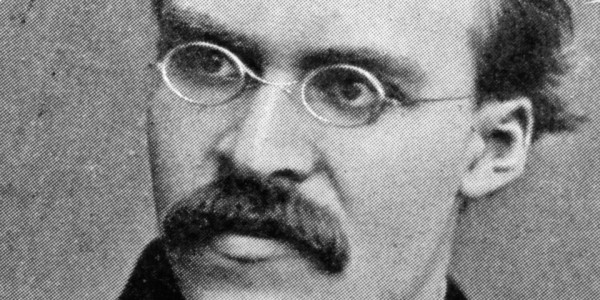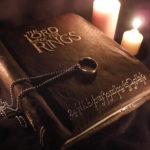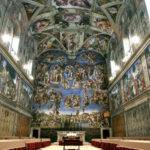10 Atheists Who Engage Religion Charitably
by Artur Rosman
Filed under Atheism, Religion
David Bentley Hart is one of our foremost theologian-philosophers, an American intellectual treasure who has ransacked the thesaurus while writing books such as The Beauty of the Infinite, The Doors of the Sea: Where Was God in the Tsunami?, and the recent The Experience of God.
One of the things I enjoy about his writing is how he rightfully gives credit to Nietzsche for recovering the scandalous nature of Christianity. In The Beauty of the Infinite he goes as far as saying:
"Nietzsche has bequeathed Christian thought a most beautiful gift, a needed anamnesis of itself—of its strangeness. His critique is a great camera obscura that brings into vivid and concentrated focus the aesthetic scandal of Christianity’s origins, the great offense this new faith gave the gods of antiquity, and everything about it that pagan wisdom could neither comprehend nor abide: a God who goes about in the dust of exodus for love of a race intransigent in its particularity; who apparels himself in common human nature, in the form of a servant; who brings good news to those who suffer and victory those who are as nothing; who dies like a slave and outcast without resistance; who penetrates to the very depths of hell in pursuit of those he loves; and who persists even after death not as a hero lifted up to Olympian glories, but in the company of peasants, breaking bread with them an offering them the solace of his wounds. In recalling theology to the ungainliness of the gospel, Nietzsche retrieved the gospel from the soporific complacency of modernity (and at a time when modernity had gained a commanding advantage over it) …"
Singing the praises of Nietzsche is one thing. And it is a good thing. Rene Girard does the same in his I See Satan Fall Like Lightening. But there is no need to hearken back to a Golden Age of intellectually respectable atheism as David Bentley Hart does in his latest piece in First Things entitled “Gods and Gopniks.” Here’s what he said:
Which brings me to Adam Gopnik, and specifically his New Yorker article of February 17, ‘Bigger Than Phil’—the immediate occasion of all the rude remarks that went coursing through my mind and spilling out onto the page overhead. Ostensibly a survey of recently published books on (vaguely speaking) theism and atheism, it is actually an almost perfect distillation of everything most depressingly vapid about the cogitatively indolent secularism of late modern society. This is no particular reflection on Gopnik’s intelligence—he is bright enough, surely—but only on that atmosphere of complacent ignorance that seems to be the native element of so many of today’s cultured unbelievers. The article is intellectually trivial, but perhaps culturally portentous.
Stephen Bullivant’s Faith and Unbelief offers a better strategy for Christians who want to engage atheists. He proposes that Christians should seek out the best among them, those who are most open to dialogue. It makes sense to engage the Nietzsches of our age without forgetting that the 19th century had its fair share of Feuerbachs, Renans, and Thomas Huxleys.
To this end, I came up with a list of ten books by ten living atheists who engage religion (mostly) charitably.
It didn’t take me very long. I’m sure you can think of some prominent figures that I’ve omitted. They are listed below along with representative books, and their publisher blurbs.
1. Julia Kristeva, This Incredible Need to Believe
“Unlike Freud, I do not claim that religion is just an illusion and a source of neurosis. The time has come to recognize, without being afraid of ‘frightening’ either the faithful or the agnostics, that the history of Christianity prepared the world for humanism.”
So writes Julia Kristeva in this provocative work, which skillfully upends our entrenched ideas about religion, belief, and the thought and work of a renowned psychoanalyst and critic. With dialogue and essay, Kristeva analyzes our “incredible need to believe”—the inexorable push toward faith that, for Kristeva, lies at the heart of the psyche and the history of society. Examining the lives, theories, and convictions of Saint Teresa of Avila, Sigmund Freud, Donald Winnicott, Hannah Arendt, John Paul II, and other individuals, she investigates the intersection between the desire for God and the shadowy zone in which belief resides.
2. Slavoj Zizek, The Puppet and the Dwarf
The Puppet and the Dwarf offers a close reading of today’s religious constellation from the viewpoint of Lacanian psychoanalysis. He critically confronts both predominant versions of today’s spirituality—New Age gnosticism and deconstructionist-Levinasian Judaism—and then tries to redeem the “materialist” kernel of Christianity. His reading of Christianity is explicitly political, discerning in the Pauline community of believers the first version of a revolutionary collective. Since today even advocates of Enlightenment like Jurgen Habermas acknowledge that a religious vision is needed to ground our ethical and political stance in a “postsecular” age, this book—with a stance that is clearly materialist and at the same time indebted to the core of the Christian legacy—is certain to stir controversy.
3. Jurgen Habermas, An Awareness of What is Missing
In his recent writings on religion and secularization, Habermas has challenged reason to clarify its relation to religious experience and to engage religions in a constructive dialogue. Given the global challenges facing humanity, nothing is more dangerous than the refusal to communicate that we encounter today in different forms of religious and ideological fundamentalism.
In 2007 Habermas conducted a debate, under the title ‘An Awareness of What Is Missing’, with philosophers from the Jesuit School for Philosophy in Munich. This volume includes Habermas’s essay, the contributions of his interlocutors and Habermas’s reply to them. It will be indispensable reading for anyone who wishes to understand one of the most urgent and intractable issues of our time.
4. Thomas Nagel, Mind and Cosmos
The modern materialist approach to life has conspicuously failed to explain such central mind-related features of our world as consciousness, intentionality, meaning, and value. This failure to account for something so integral to nature as mind, argues philosopher Thomas Nagel, is a major problem, threatening to unravel the entire naturalistic world picture, extending to biology, evolutionary theory, and cosmology.
Since minds are features of biological systems that have developed through evolution, the standard materialist version of evolutionary biology is fundamentally incomplete. And the cosmological history that led to the origin of life and the coming into existence of the conditions for evolution cannot be a merely materialist history, either. An adequate conception of nature would have to explain the appearance in the universe of materially irreducible conscious minds, as such.
5. John N. Gray, Heresies Against Progress and Other Illusions
By the author of the best-selling Straw Dogs, this book is a characteristically trenchant and unflinchingly clear-sighted collection of reflections on our contemporary lot. Whether writing about the future of our species on this planet, the folly of our faith in technological progress, or the self-deceptions of the liberal establishment, John Gray dares to be heretical like few other thinkers today.
6. Alain Badiou, St. Paul: The Foundation of Universalism
In this bold and provocative work, French philosopher Alain Badiou proposes a startling reinterpretation of St. Paul. For Badiou, Paul is neither the venerable saint embalmed by Christian tradition, nor the venomous priest execrated by philosophers like Nietzsche. He is instead a profoundly original and still revolutionary thinker whose invention of Christianity weaves truth and subjectivity together in a way that continues to be relevant for us today.
In this work, Badiou argues that Paul delineates a new figure of the subject: The bearer of a universal truth that simultaneously shatters the strictures of Judaic Law and the conventions of the Greek Logos. Badiou shows that the Pauline figure of the subject still harbors a genuinely revolutionary potential today: The subject is that which refuses to submit to the order of the world as we know it and struggles for a new one instead.
7. Mary Midgley, Science as Salvation: A Modern Myth and Its Meaning
Mary Midgley in this book discusses the high spiritual ambitions which tend to gather around the notion of science, and, in particular, some very odd recent expressions of them. When everyone viewed the world as God’s creation, there was no problem about the element of worship involved in studying it, nor about science’s function in mapping people’s lives. But now these things have grown puzzling. Officially, science claims only the modest function of establishing facts. Yet people still hope for something much vaster and grander from it—the myths by which to shape and support life in an increasingly confusing age.
8. Simon Critchley, The Faith of the Faithless
The return to religion has arguably become the dominant theme of contemporary culture. Somehow, the secular age seems to have been replaced by a new era where political action flows directly from theological, indeed cosmic, conflict. The Faith of the Faithless lays out the philosophical and political framework of this idea and seeks to find a way beyond it. Should we defend a version of secularism or quietly accept the slide into theism? Or is there another way?
9. Giorgio Agamben, The Kingdom and the Glory
Why has power in the West assumed the form of an “economy,” that is, of a government of men and things? If power is essentially government, why does it need glory, that is, the ceremonial and liturgical apparatus that has always accompanied it?
The greatest novelty to emerge from The Kingdom and the Glory is that modern power is not only government but also glory, and that the ceremonial, liturgical, and acclamatory aspects that we have regarded as vestiges of the past actually constitute the basis of Western power. Through a fascinating analysis of liturgical acclamations and ceremonial symbols of power—the throne, the crown, purple cloth, the Fasces, and more—Agamben develops an original genealogy that illuminates the startling function of consent and of the media in modern democracies. With this book, the work begun with Homo Sacer reaches a decisive point, profoundly challenging and renewing our vision of politics.
10. Michael Ruse, Science and Spirituality
In Science and Spirituality: Making Room for Faith in the Age of Science, Michael Ruse offers a new analysis of the often troubled relationship between science and religion. Arguing against both extremes—in one corner, the New Atheists; in the other, the Creationists and their offspring the Intelligent Designers – he asserts that science is undoubtedly the highest and most fruitful source of human inquiry. Yet, by its very nature and its deep reliance on metaphor, science restricts itself and is unable to answer basic, significant, and potent questions about the meaning of the universe and humankind’s place within it: Why is there something rather than nothing? What is the ultimate source and foundation of morality? What is the nature of consciousness? What is the meaning of it all? Ruse shows that one can legitimately be a skeptic about all of these questions, and yet why it is open for a Christian, or member of any faith, to offer answers. Scientists, he concludes, should be proud of their achievements but modest about their scope. Christians should be confident of their mission but respectful of the successes of science.
Related Posts
Note: Our goal is to cultivate serious and respectful dialogue. While it's OK to disagree—even encouraged!—any snarky, offensive, or off-topic comments will be deleted. Before commenting please read the Commenting Rules and Tips. If you're having trouble commenting, read the Commenting Instructions.













